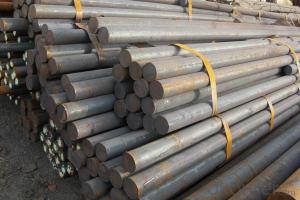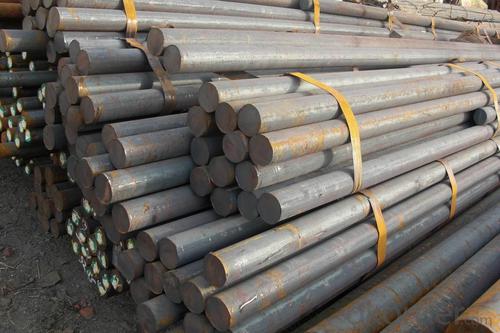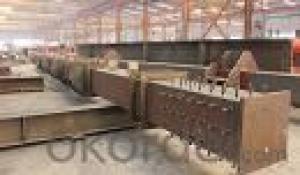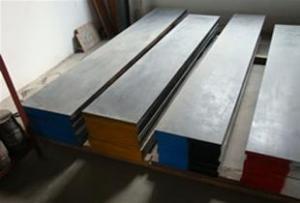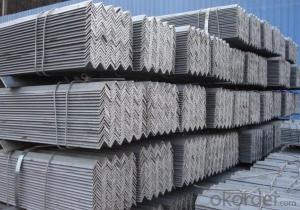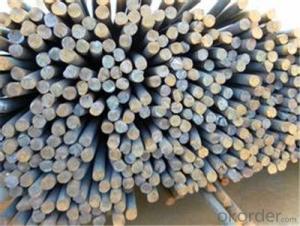Good Quality Round Steel
- Loading Port:
- China Main Port
- Payment Terms:
- TT OR LC
- Min Order Qty:
- -
- Supply Capability:
- -
OKorder Service Pledge
OKorder Financial Service
You Might Also Like
Specifications
1.EF+EAF+LF+VD+ESR
2.Competitive price
3.ISO&IQNet certificate
4.Excellent hardenability
5.P/S lessthan 0.020
Cold Work Tool Steel 1.2379, Alloy Steel Round Bars 1.2379, Din 1.2379 Steel Rod
Chemical composition 1.2379 round bar
| Equivalent grades | ||||
| GB | DIN | AISI | JIS | BS |
| Cr12Mo1V1 | 1.2379 | D2 | SKD11 | BD2 |
| Chemical composition | |||||||
| C | Si | Mn | Cr | P | S | V | Mo |
| 1.50-1.60 | 0.10-0.40 | 0.15-0.45 | 11.50-12.50 | 0.03MAX | 0.03MAX | 0.90-1.10 | 0.60-0.80 |
Specification
Round bar | Diameter (mm) | Length (mm) |
|
50~500 | 2000~5800 |
| |
plate/sheet | Thickness (mm) | Width (mm) | Length (mm) |
20~400 | 80~1000 | 2000~5800 |
Steel Surface
| Steel Sharp | Surface treatment |
| Round bar | Black/Grinding/Polished/Peeled/Turned |
| steel plate | Black/Milling/Machined |
Characteristic 1.2379
1.High hot strength and hardness.
2.Good toughness and abrasion resistance.
3.Heat treatment deformation small
Finished goods condition: 1.2379 hot forging/hot rolling + annealing/normalizing +
tempering/quenching + tempering/any conditions based on the customer's requirement
Surface conditions: rough machining/fine machining/based on the customer's requirement
Ultrasonic inspection: 100% UT acco to En1921D/d or based on the customer's requirement
- Q: What is the tensile strength of steel round bars?
- The tensile strength of steel round bars can vary depending on the specific grade and composition of the steel. However, on average, steel round bars typically have a tensile strength ranging from 400 to 700 megapascals (MPa).
- Q: What is the maximum elongation of steel round bars?
- The maximum elongation of steel round bars may vary based on the particular grade and composition of the steel. Nonetheless, typically, the maximum elongation for steel round bars hovers around 20-30% of their original length. Consequently, these bars can stretch or elongate by up to 20-30% before reaching their breaking point or ultimate tensile strength. It is worth mentioning that this maximum elongation is influenced by several factors, including steel quality, manufacturing process, and any heat treatment employed on the bars. Therefore, it is advisable to refer to the manufacturer's specific specifications and consider the intended application of the steel round bars in order to establish the maximum elongation for a specific case.
- Q: What is the difference between cast iron and round steel?
- Is also called round billet cast iron or iron by calcination with heavy machinery forging into steel (called the moral is toughened and hardened into steel or steel), the main component of alloy is composed of iron, carbon and silicon steel just according to the different areas in the use of alloy in carbon and silicon content in different precipitation in steel forging process of carbon and silicon was decreased to different areas of demand.
- Q: What is the maximum length of a steel round bar that can be manufactured?
- The maximum length of a steel round bar that can be manufactured is dependent on various factors such as the manufacturing capabilities, equipment, and transportation limitations. However, in general, steel round bars can be manufactured in lengths ranging from a few meters to up to 12 meters or more.
- Q: What are the weight calculations for steel round bars?
- One can determine the weight of steel round bars through a simple formula. To calculate the weight of a steel round bar, multiply the square of its diameter in millimeters by the length in meters, and then multiply the result by the specific weight of steel, which is typically around 7.85 grams per cubic centimeter. The weight of a steel round bar can be calculated using the following formula: Weight = (Diameter^2 x Length x Specific Weight of Steel) / 1000 In this formula: - Diameter represents the diameter of the round bar in millimeters. - Length indicates the length of the round bar in meters. - Specific Weight of Steel refers to the density of steel, usually 7.85 grams per cubic centimeter. - 1000 is employed to convert the weight from grams to kilograms. It is essential to consider that this formula assumes the round bar is made solely of steel and does not take into account any variations in the specific weight among different steel alloys. Moreover, it is crucial to maintain consistent units throughout the calculation, whether millimeters or meters, for accurate results.
- Q: Can steel round bars be used for making gates?
- Yes, steel round bars can be used for making gates. Steel round bars are strong and durable, making them suitable for gate construction. They can be welded together to create a sturdy gate frame, and can also be used for decorative elements or as pickets. Additionally, steel round bars can be easily customized and shaped to fit the desired gate design.
- Q: What is the minimum diameter available for steel round bars?
- The minimum diameter available for steel round bars can vary depending on the manufacturer and the specific requirements of the project. However, commonly available sizes range from 1/4 inch to 1 inch in diameter.
- Q: What is the maximum aluminum content allowed for steel round bars?
- The maximum aluminum content allowed for steel round bars typically varies depending on the specific industry standards and specifications. However, a common maximum aluminum content limit for steel round bars is around 0.20-0.35%.
- Q: What is the composition of steel round bars?
- Steel round bars are typically composed of iron and carbon, with small amounts of other elements such as manganese, silicon, and sulfur. The exact composition can vary depending on the specific grade and intended use of the steel.
- Q: What are the limitations of using steel round bars?
- Using steel round bars in various applications has several limitations. One such limitation is their vulnerability to corrosion. Steel round bars, particularly those made of carbon steel, are prone to rusting when exposed to moisture or harsh environments. This can have a significant impact on their structural integrity and lifespan. Another limitation is their weight. Steel is a heavy material, and round bars can be especially cumbersome to handle and transport, especially in large quantities. This can make the installation process more difficult and increase the overall project cost. In addition, steel round bars may not be suitable for applications that require high levels of flexibility or bending. Their rigid nature makes it challenging to shape or mold them into intricate designs. This limitation can restrict their use in certain industries or architectural designs that demand more versatile materials. Another factor to consider is the cost of steel round bars. Depending on the grade, quality, and market conditions, the price of steel round bars can fluctuate significantly. This can be a financial limitation for projects with tight budgets or when the cost of raw materials is a crucial factor. Lastly, steel round bars may not be suitable for applications that require high resistance to extreme temperatures. While steel has good thermal conductivity, certain temperature ranges can affect its structural properties, potentially causing weaknesses or deformations. Overall, steel round bars have widespread use and offer many advantages. However, it is essential to consider their limitations such as susceptibility to corrosion, weight, limited flexibility, cost, and temperature sensitivity when selecting materials for specific applications.
Send your message to us
Good Quality Round Steel
- Loading Port:
- China Main Port
- Payment Terms:
- TT OR LC
- Min Order Qty:
- -
- Supply Capability:
- -
OKorder Service Pledge
OKorder Financial Service
Similar products
Hot products
Hot Searches
Related keywords
